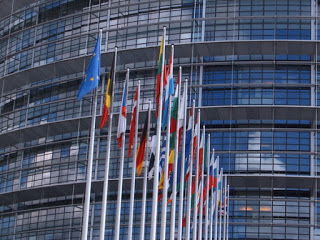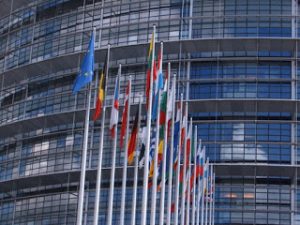Search Results For: europe

Why is Estonia Considered Crypto Capitol of Europe?
At this point, cryptocurrencies will play a major role in the global financial industry soon. Millions of people are already using them, and these digital assets had a massive breakthrough in 2021. What’s even more important is that many companies and countries are starting to accept them.
In a world’s first, El Salvador became the only country to fully adopt Bitcoin and even use it for various trading purposes. That allowed the cryptocurrency to grow and stabilize itself even more. Even though many would think that El Salvador will be leading the pack in the crypto world, that did not concern Europeans too much.
Why? Because they already have a country that kind of regulates these digital assets and allows them to trade with them. That country is Estonia, and, in this article, we’ll be looking at why Estonia is considered the crypto capitol of Europe. Let’s dive into the details.
Estonia Was the First Country to Regulate Cryptocurrencies
First, Estonia was among the first countries in the world to start regulating cryptocurrencies. It started accepting them around a decade ago and since then, became a haven for all crypto traders. That ‘tradition’ was kept over the years as all new traders in the continent are advised to invest in crypto here.
Aside from trading and making a profit, crypto users keep these digital assets to pay for services/products and for entertainment. One of the most popular entertainment types that you can participate in with crypto is online gaming, specifically casino sites.
Since online casinos operate on the Internet now and cryptocurrencies are fully optimized for online use, they were more than fond of allowing registered players to deposit and withdraw money with them.
Estonia Is Fond of Using Technology to Its Advance
Next up, Estonia is well-known for leaning towards technology. After all, apart from being known as the first country in Europe to regulate cryptocurrencies, it is also the first country in the world to introduce the e-Residency program, which is like digital citizenship.
This allows participants to use numerous services from the government, including starting an EU-based company without the need of travelling to Estonia.
When it comes to cryptocurrencies and payment methods, one interesting fact about Estonia is that it is a cashless society. Statistics show that 99% of all transactions are conducted digitally. Residents here are always looking for more efficient online payment methods and that is what led the country to cryptocurrencies.
As you may know, crypto transactions are instant, whereas transactions with regular payment methods can take up to a few days to be completed. That makes these digital assets perfect for paying online and conducting business.
The industry is Well-Regulated in the Country
Lastly, the Estonian government has recently tightened regulations as the Financial Intelligence Unit, which is under the wing of Estonia’s Finance Ministry, is now able to revoke crypto licenses in efforts to fight money laundering.
That makes this country extremely safe for all those who are willing to invest in cryptocurrencies. Extra security is always welcomed, especially in times when online scams are proving to be a massive problem. As data shows, more than $240 million has been lost in scams so far in 2021. Millions of people fall victim to this problem and all of us want that extra security layer.
Thanks to the fact that cryptocurrencies utilize cryptography, which provides a certain level of online anonymity, users are safer, but with Estonia’s regulations, that security is taken to the next level.
Open your free digital wallet here to store your cryptocurrencies in a safe place.

Bitcoin regulation in Europe: “it’s too early”

During a recent event held by the European Parliament, members talked about new technologies including the Blockchain and Ethereum and Bitcoin Regulation.
According to them, the European Parliament will have to regulate and monitor the new tech but “it’s too early to intervene at this stage, because we as legislators don’t yet see sufficiently clearly to know what the main issues are going to be – so in order to not to stifle innovation, we don’t want it to be now.””, said MEP Jakob von Weizsäcker.
So, the EU wants just to monitor blockchain and smart contracts in order to allow developers doing their job.
Also, MEP Eva Kaili from Greece explained that regulation is necessary to protect citizens, but EU doesn’t want to suffocate innovations.
“[In] 2008 when the crisis started in the European Union, especially in my country [Greece], people lost trust in banks and in the politicians. I woundn’t blame them because we didn’t protect them and the reaction was that some young people that we don’t really know discover this technology that actually makes unnecessary to have banks, politicians and intermediaries. So the potential is there, but it is still under progress”.
Also, she continues by saying the following:
“Blockchain is not just bitcoin and bitcoin is not just blockckhain. We need to understand how to protect citizens because if we help them trust this technology, they will actually start to using it. I do believe that banks will outsource a lot of their services,” she said.
Bitcoin regulation to regain trust by citizens
“We’ll have to educate citizens on how to use it […] Hopefully, [bitcoin regulation] will come and we’re going to try to protect the technology and not to stop it. I know that usually politicians and banks don’t want to change and they want to keep control, but I think this technology is unstoppable and we have to give control back to the citizens and maybe this way we can regain some trust,” Kaili argues.
Watch the full conference video here.
Open your free digital wallet here to store your cryptocurrencies in a safe place.

Europe Bitcoin report published by the EU Parliament. Read it here.
Below you can read the full Europe Bitcoin research published by the European Parliament a few days ago.
It is related to the blockchain technology and digital currencies, exploring distributed ledger use cases including digital payments, patent protection, smart contracts and online voting.
This research provides an educational point of view for EU’s legislative members, so probably we will experience a new Bitcoin regulation in the next future.
Researchers who works at the EU Parliament have studied several aspects of the distributed ledger in the past.
For example, a working group sponsored by the Parliament studied how the blockchain’s power to secure data could provide transparency during elections.
“Although blockchains are not the solution for every problem, and even if they will not revolutionize every aspect of our lives, they could have a substantial impact in many areas, and it is necessary to be prepared for the challenges and opportunities they present.”
“Europe Bitcoin” paper
The research suggests a few possible approaches for the European lawmakers, who recently approved the creation for a new task force focused on blockchain and digital currencies.
Also, the paper suggests more future explorations by saying that regulators could regulate and yield legal legitimacy to digital currencies transactions. More and more countries are regulating bitcoin and other virtual currencies during the last few monts.
The document’s authors explained also that this revolutionary techbology could provide many benefits to European citizens, even if it seems to be applicable only in a few cases.
“While the most idealistic and revolutionary visions of blockchain development will probably remain no more than visions, even moderate implementation of blockchain may still promote some degree of redistribution and transparency,” explained the authors in the document.
Click here to read the full Europe Bitcoin document for free.
Open your free digital wallet here to store your cryptocurrencies in a safe place.

Blockchain Regulation in Europe: everything you need to know
Today I want to explain you everything you need to know about the Blockchain Regulation in Europe.
Recently, in fact, the executive arm of the European Union government revealed that is working on the blockchain to “support” distributed ledger-based projects.
According to this new official press release published on February 7th, the Commission is looking for growing its efforts on supporting more projects related to the distributed ledger technology (DLT).
The European Commission is “actively monitoring Blockchain and DLT developments” and is working on exploring “DLT benefits and challenges as well as fields for application in financial services”.
Also, the official press release explained that the Commission wants to “pilot projects to foster decentralised innovation ecosystems and help reshape interactions between consumers, producers, creators and among citizens, businesses and administrations to the end benefit of society”.
A task force for Blockchain Regulation
Last year, the European Parliament also created a new task force led by the Commission, to study the blockchain.
This task force has not only the goal of studying the blockchain but also to support projects related to the ledger and studying a way for a blockchain regulation.
The European Commissioner for Digital Single Market and Vice President of the European Commission, explained:
“The Commission is already supporting distributed ledger tech-enabled projects (DECODE, D-Cent, MyHealth MyData). Support activities are going to increase in the coming months (e.g. Decentralised Data Management). A study will be launched to investigate how DLT can help in reshaping public services and preparing for EU specific DLT actions to address relevant EU challenges.”
Ansip also said that the Commission will collaborate with the Parliament to organize blockchain events and workshops.
“The Commission will organise a kick-off conference with the European Parliament on Demystifying Blockchain and a series of workshops to look at Blockchain developments and use case applications”.
Open your free digital wallet here to store your cryptocurrencies in a safe place.

Change Bitcoin Euro: how to sell crypto in Europe
People who decide to invest in crypto often have to change Bitcoin Euro, but the main problem is always the same: where? which platform should I use in order to have low fees and instant conversion?
We at HolyTransaction have found a solution for these issues and we have launched HolyTransaction Trade, an instant exchange that allows you to change Bitcoin Euro in a few steps.
Through our new service you can instantly convert Bitcoin into Euro and vice versa, buying and selling your cryptocurrencies at any time.
We have a few options to do so: Bitcoin to Virtual Credit Card, Bank Transfer, and Halcash ATM ( the latest one option is available in Poland and Spain).
Or Bitcoin to EasyPay, TeleIngreso and PayNet if you live in Greece, Mexico or Spain.
Change Bitcoin Euro: step-by-step guide
By clicking on the links below you can read step-by-step guides to change your Bitcoin into Euro:
Also, if you don’t know exactly how a Bitcoin Virtual Credit Card works and which benefits it has, you can read the insightful article below to understand why you might need a virtual credit card to do shopping online.
Open your free digital wallet here to store your cryptocurrencies in a safe place.

Yacht with Bitcoin: how to rent it in Europe
A yacht with Bitcoin in Europe? Read this article and find out how to rent or buy it.
A few months ago you might remember about a € 100 000 Tesla sold with Bitcoin in Finland, where Auto Outlet Helsinki Oy managed this transactions for a private citizen.
Users can buy everything they want with digital currencies, thanks to platforms such as OpenBaazar, GiftOff and more.
But from now one people can also buy and rent luxury yacht with bitcoin, as NAMI integrated bitcoin as a payment option.
NAMI is a company that rents luxury yachts and its director, Miika Toivonen is the same person who works for the Auto-Outlet Helsinki and sold the Tesla I previously mentioned.
Now Toivonen is is willing to allow users to buy luxury yacht with bitcoin.
“We’ve always willing to take part on everything that is new, like selling Teslas with bitcoin, so why wouldn’t we also rent yachts as well. So far we’ve sold a nice amount of Tesla electric cars around Europe, so I believe the same thing will work with luxury yachts as well.”, explained Director of NAMI Miika Toivonen in a press release.
With over 100000 merchants worldwide that accept bitcoin as a payment option, Bitcoin is the faster growing payment option and currency in the world.
And Finland, where NAMI works, is one of the top countries on Bitcoin usage if we count the number of bitcoin currency exchanges and BTMs.
“Meanwhile when numbers and numbers financial operators are getting more and more interested about bitcoin, we’ve noticed that demand for expensive luxury brands bought with bitcoin is rising. This is simply because there is more wealthy players on board. We were launching bitcoin payments for Luxury Collection and in the future we want to help more companies to benefit from Bitcoin-teknology and phenomenom.” explained us Aleksi Vitakoski from Bitcoinkaupat.
“In my opinion selling luxury cars like Tesla with bitcoin is some remarkable sales in bitcoin space, in Finnish and in European scale. It’s nice to see that adding one payment option can lead to purchases like that and it’s also very natural move by NAMI to extend bitcoin payments to yachts as well.”, commented Prasos Oy CEO Henry Brade.

Open your free digital wallet here to store your cryptocurrencies in a safe place.
Blockchain Europe: Europol studies the ledger

Blockchain Europe
Open your free digital wallet here to store your cryptocurrencies in a safe place.
Europe Blockchain: € 1m to study the distributed ledger
Europe Blockchain: a legislative objective
Open your free digital wallet here to store your cryptocurrencies in a safe place.

A task force to control digital currency in Europe
Task force creation: yes or not?
Open your free digital wallet here to store your cryptocurrencies in a safe place.

Twitter, Bitstamp, European Parliament: Monthly Recap about Bitcoin
6 amazing pictures about Bitcoin
15 oddest places where Bitcoin is accepted
That’s why $400 Bitcoin price is low
Blockchain is the perfect technology according to the European Parliament
During the last week, a European parliament member gave a speech about consumer protection for the latest campaign that aims at realizing new rules related to the blockchain.
How Twitter can teach you everything you need to know about Bitcoin
Twitter is one of the most popular social networks in the world and there are over 307 million people that actively use Twitter.
Click on the title to read the full list of influencers you may need to follow on Twitter to deeply understand bitcoin and the blockchain.
Open your free digital wallet here to store your cryptocurrencies in a safe place.
